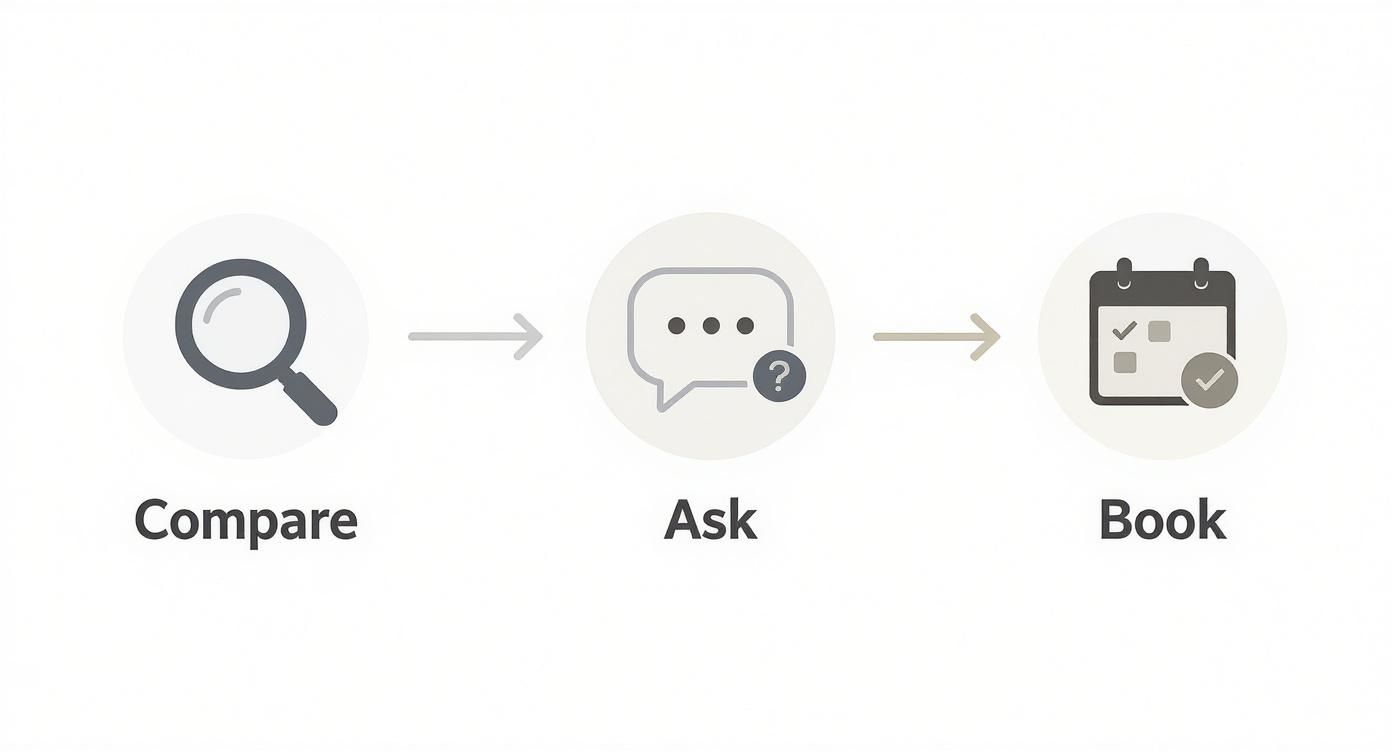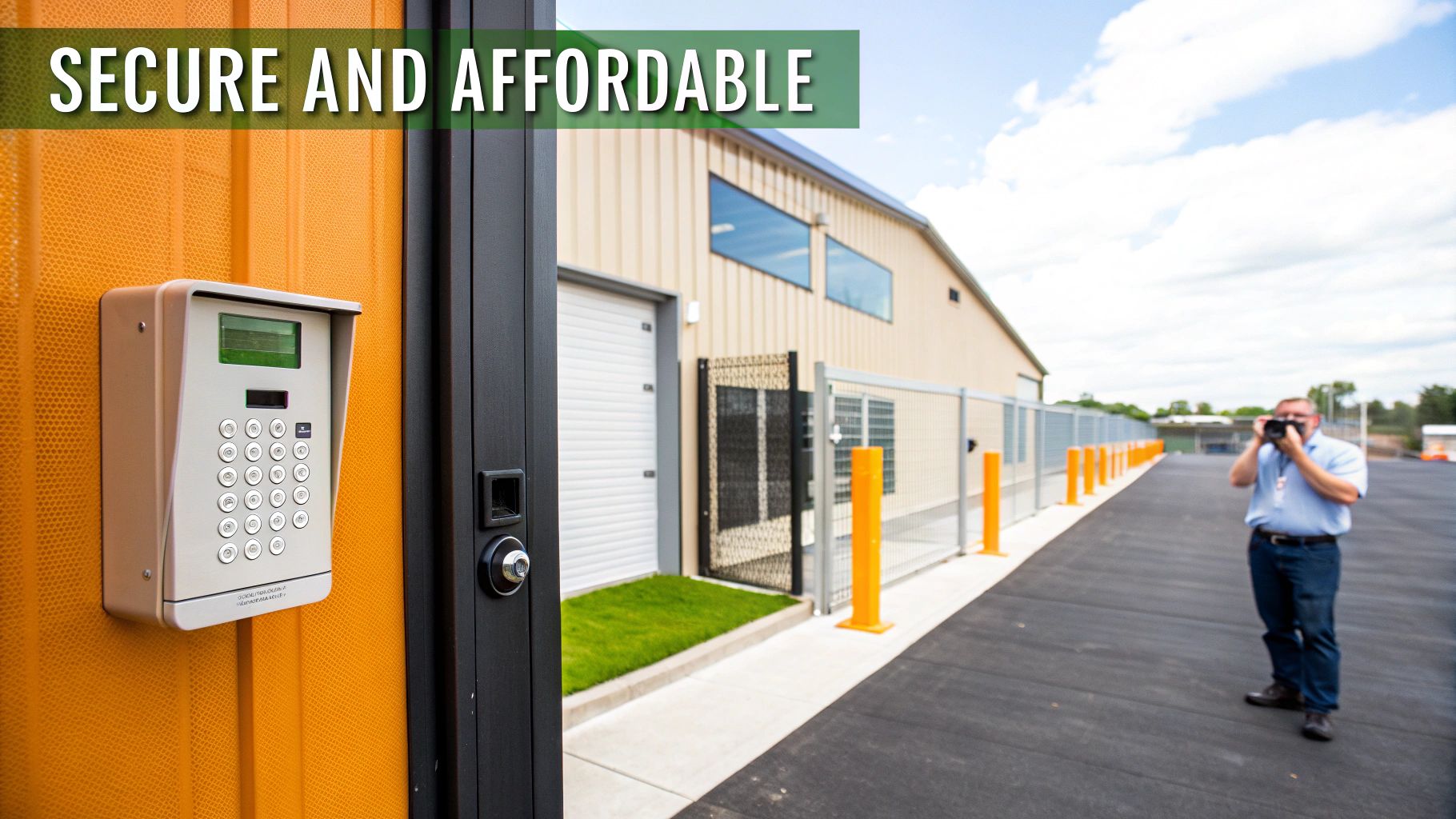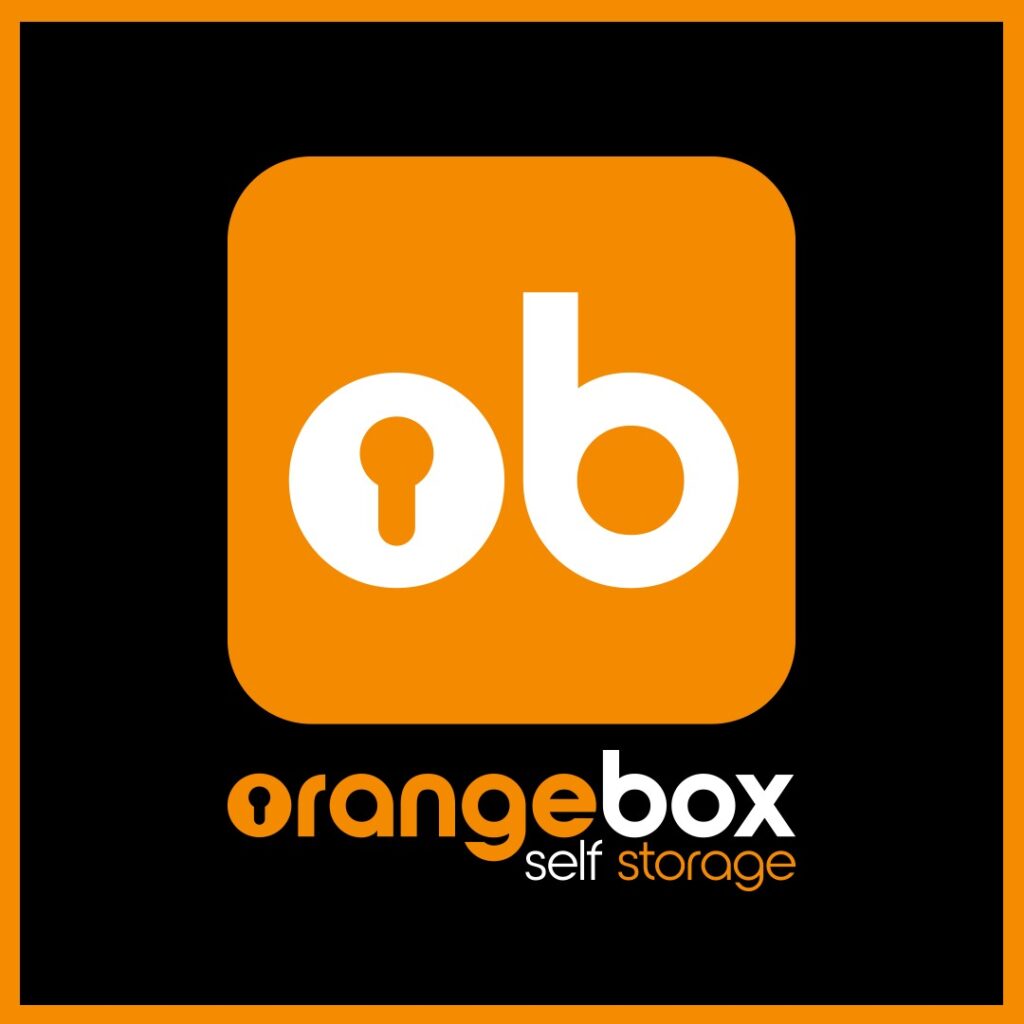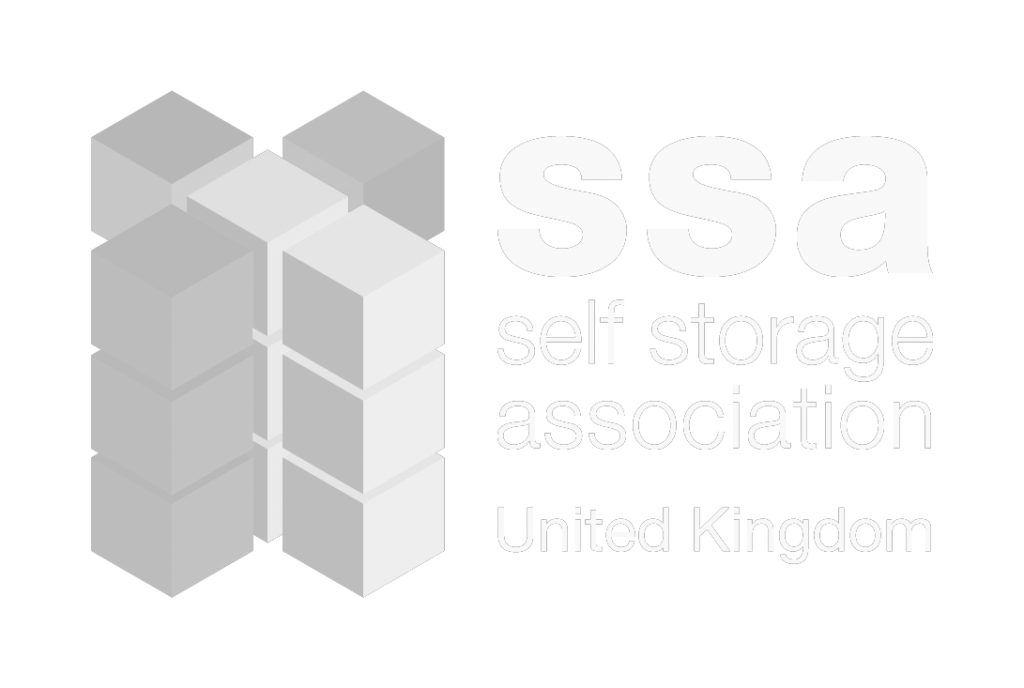When you're searching for cheap storage units near me, it’s easy to focus on the headline price. But with the UK average hovering between £27 and £30 per square foot annually, the real trick is looking beyond that number. The goal isn't just to find the cheapest option, but to find a secure, convenient space that genuinely fits your budget without any nasty surprises.
Decoding the Search for Affordable Storage

Let’s be honest, the word ‘cheap’ can be a bit of a red flag. A rock-bottom monthly fee might look tempting, but it could be masking poor security, a location that’s miles out of your way, or restrictive access hours that end up costing you more in time and stress. What you’re really after is the best value.
So, what actually drives the cost of self-storage? It usually boils down to a few key things.
Key Factors for Finding Your Best Deal
Here’s a quick look at the essential elements to weigh when you're hunting for an affordable and reliable storage unit.
| Factor | What to Look For | How It Impacts Your Cost |
|---|---|---|
| Location | Proximity to city centres vs. suburban or industrial areas. | Units closer to town are nearly always pricier. Going a few miles further out can slash your bill, especially if you don't need daily access. |
| Features | Climate control, 24/7 CCTV, individual unit alarms. | These amenities add to the cost but are essential for protecting sensitive items like electronics, wooden furniture, or important documents. |
| Size & Access | Ground-floor, drive-up access vs. upper-level units. | You'll pay a premium for the convenience of a large, ground-floor unit. A realistic size estimate prevents you from paying for space you don't need. |
Understanding these trade-offs is the first step to finding a unit that’s both budget-friendly and perfectly suited to your needs.
Understanding the UK Storage Market
The self-storage industry here in the UK is massive, now covering a whopping 64.3 million square feet of space. Even with an average rental return of £29.13 per square foot, the fierce competition between providers helps keep prices reasonable, particularly once you get outside of major cities like London or Manchester.
The smartest way to find a genuinely cheap storage unit is to define your non-negotiables first. Decide what level of security and access you absolutely need, and then search for the most affordable option that meets those criteria.
To really get to grips with what you should be looking for, it's worth understanding the key considerations when renting storage. Properly weighing these elements will help you find a unit that fits your budget without compromising on what's important.
For a more detailed breakdown of what you can expect to pay, check out our guide on how much self-storage costs in the UK. It'll set you on the right path to making a confident and cost-effective decision.
Smart Strategies to Uncover Local Storage Deals
Finding a genuinely good deal on a storage unit is a bit like being a local detective. The big national chains usually hog the first page of Google, but the real value is often tucked away with smaller, independent facilities that don't have massive advertising budgets. The first step to unlocking serious savings is to expand your search beyond the obvious.
Kick things off with online comparison sites, but use them wisely. Don't just filter by price; dive into the most recent reviews. Pay close attention to any chatter about surprise price hikes or security problems, because that rock-bottom initial price can be very misleading.
Look Beyond the Big Names
While the major chains offer a certain consistency, local, family-run storage businesses are often where you'll find more competitive rates and a personal touch. Here’s where to hunt them down:
- Local Business Directories: Have a look through online directories like Yelp or Yell. These platforms are often home to smaller businesses that thrive on word-of-mouth and their local reputation.
- Community Forums: Jump into local Facebook groups or neighbourhood forums. A quick post asking for recommendations can uncover hidden gems your neighbours rave about for their value and reliability.
- Go for a Drive: Sometimes, the old-fashioned way is the best. A short drive around nearby industrial estates can reveal well-kept facilities that just don’t pop up in a broad online search for "cheap storage units near me."
Keep this in mind: a slightly less convenient location could mean major monthly savings. If you only need to pop in now and then, a facility that's a 15-minute drive further out could easily slash your bill by 20% or more.
Master the Art of Timing
The price of a storage unit isn’t set in stone; it ebbs and flows with demand. You can absolutely use this to your advantage by booking during the off-peak seasons. The winter months, for instance, are usually slower for moving, which means facilities might be more open to offering discounts just to fill their empty units.
It also pays to set up alerts on comparison sites for new promotions. Lots of facilities run short-term deals like "first month free" or "50% off for three months." If you're looking in a specific area, you can sometimes find brilliant local deals for Mammoth Storage Sunshine Coast through dedicated discount platforms. Acting fast when these offers appear can lock in a fantastic rate.
Finally, never underestimate the power of just asking. When you ring up a facility, make a point to enquire about any unadvertised specials for students, military personnel, or long-term rentals. A real conversation can often uncover a flexibility in pricing you'll never find online. And if you're specifically after a versatile and secure option, exploring the benefits of container storage near you can also lead you to some surprisingly affordable alternatives to traditional indoor units.
Choosing the Right Size Unit Without Overpaying
One of the quickest ways to burn through your budget is by renting more storage space than you actually need. It’s a classic mistake. You get a bit anxious about running out of room and end up paying to store empty air. The trick is to stop thinking in square footage and start visualising your belongings in real-world terms.
Take a standard 50 sq ft unit. That’s roughly the size of a large garden shed. It can easily swallow the contents of a one-bedroom flat, including a double bed, a sofa, and a good stack of boxes. A small business with extra stock, however, might need a 150 sq ft unit, which feels more like a single-car garage. Getting this picture right from the start is key to avoiding wasted money.
To Heat or Not to Heat: Climate Control Explained
The next big decision that impacts your monthly bill is climate control. This feature keeps the temperature and humidity inside your unit stable, but it can easily add 15-20% to your costs. So, is it a must-have or a pricey add-on you can do without?
Honestly, it all comes down to what you’re storing. For anything sensitive to moisture or big temperature swings, it’s not just a nice-to-have; it's essential.
- Wooden Furniture: Can warp, crack, or become a breeding ground for mould in damp, fluctuating conditions.
- Electronics: Delicate circuits and internal parts really don't like extreme cold or condensation.
- Important Documents & Photos: Humidity is the enemy here, causing paper to yellow, stick, and mildew.
- Clothing & Fabrics: Can quickly develop that tell-tale musty smell or grow mould if left in a damp space.
But if you're just stashing garden tools, plastic tubs of general clutter, or anything else you’d happily leave in your garage for a year, you can confidently skip the extra expense.
For a clearer picture of what fits where, our visual storage unit size guide is a great tool to help you make the right call.
A Practical Guide to Storage Unit Sizes
Sometimes seeing the numbers laid out with everyday examples makes all the difference. Here’s a quick breakdown to help you match your stuff to the right-sized space.
| Unit Size (sq ft) | Roughly the Size Of | What It Typically Holds | Perfect For |
|---|---|---|---|
| 25 sq ft | Large walk-in wardrobe | Small furniture, dozens of boxes, sports gear | Students between terms, decluttering a single room |
| 50 sq ft | Large garden shed | Contents of a one-bedroom flat (sofa, bed, appliances) | Moving out of your first flat or studio apartment |
| 75 sq ft | Luton van | Contents of a two-bedroom flat | Small house moves or storing items during a renovation |
| 100 sq ft | Single garage | Contents of a two-bedroom house, including appliances | Families between homes or storing business inventory |
| 150+ sq ft | Large single garage | Contents of a three-bedroom house or significant stock | Major house moves or commercial storage needs |
Matching your items to these examples will get you much closer to an accurate estimate, ensuring you only pay for the space you truly need.
A simple rule of thumb: If you wouldn't be happy leaving an item in your shed or loft for a year, you should probably opt for a climate-controlled unit. This quick mental check can save you from discovering costly damage down the road.
Finding the best deal isn't just about the price tag; it's about making smart choices after comparing your options, asking the right questions, and then booking the right unit for you.

This process shows that a smart booking is the final piece of the puzzle, coming only after you've done your homework by comparing facilities and talking to them directly.
Practical Tips for Sizing Up Your Space
Before you click "book," take a minute to sketch out a rough plan of your unit. The secret to making a smaller, cheaper unit work harder is to think vertically. Good, sturdy boxes that can be stacked high let you use every inch of the unit’s height.
Just remember to leave a little aisle down the middle. It might feel like you're sacrificing space, but it means you can actually get to the boxes at the back without having to pull everything out first.
And don't forget the basics: measure your biggest items! A sofa or mattress that won't fit through the unit door is a problem you don't need on moving day. By combining a realistic size assessment with a smart call on climate control, you'll land on the most cost-effective unit that fits your needs perfectly—without paying a penny more than you have to.
How to Secure Discounts and Negotiate a Better Rate
Let’s be honest, the price you first see for a storage unit is rarely the final price you have to pay. With a little confidence and the right approach, you can often knock a decent amount off your monthly bill. Finding a genuinely cheap storage unit nearby is all about being proactive and knowing where the real savings are hiding.
Many facilities have a handful of unadvertised specials up their sleeve, designed specifically to fill empty units. You won’t always find these splashed across their website, but a quick phone call can often unlock them. It's about empowering yourself to ask for a better deal instead of just accepting the first price you’re given.
Uncovering Common Discounts
Before you even think about haggling, make sure you’ve checked off all the standard discount opportunities. These are the easy wins, the low-hanging fruit that most facilities expect savvy customers to ask about. The key is just to know they exist and see if you qualify.
Here are the most common deals to look for:
- Introductory Offers: This is the classic "first month free" or "50% off for three months." These deals are great for cutting your initial costs, but always be sure to ask what the standard rate will jump to once the promotion ends. No one likes a surprise bill.
- Student & Military Discounts: If you're a student or part of the armed forces, many storage providers, including Orange Box Self Storage, offer special rates. Just have your ID ready to take advantage of it.
- Long-Term Rental Deals: Know you'll need storage for six months or more? Ask about a long-term discount. Facilities love the stability of a long-term tenant and are often willing to drop the monthly rate in exchange for that commitment.
Don’t just assume discounts will be applied automatically. When you call or visit, explicitly ask, "What discounts are you currently offering?" You might uncover a deal that isn't advertised online.
Simple Negotiation Tactics That Actually Work
Once you've exhausted the standard discounts, it’s time to negotiate. This doesn't need to be some high-pressure, intimidating showdown. Think of it as a simple conversation aimed at finding a price that works for both of you. A polite, informed approach goes a very long way.
Put yourself in the facility manager’s shoes for a second: an empty unit is a dead asset, generating zero income. They are almost always motivated to offer a better rate to a serious customer rather than letting a unit sit vacant.
Here are a few tactics to try:
- Offer to Pre-Pay. Ask if they offer a discount for paying for several months upfront. This gives the facility guaranteed income, and they'll often reward you with a 5-10% discount on your total bill. It’s a win-win.
- Mention Competitor Pricing. If another local facility has offered you a better rate for a similar unit, bring it up. You could say something like, "I'm also looking at a unit over at [Competitor's Name], and they've offered me a rate of £X. Is there any way you can match that?" It shows you’ve done your homework.
- Ask About Sister Facilities. Sometimes, a storage company has multiple locations in the area. It's worth asking if the rates are lower at one of their other nearby sites. A manager might be able to offer you the rate from a less busy location just to secure your business.
By combining these strategies, you put yourself in the best possible position to lock in a genuinely affordable rate that fits your budget.
Balancing Low Cost with Essential Security Features

When you’re hunting for "cheap storage units near me," it’s incredibly tempting to sort by price and just pick the lowest number. But an unbelievably cheap unit often comes with a hidden cost—and that cost is usually security. Let’s be honest, the cheapest option is no bargain if your belongings aren’t safe.
This is the classic trade-off every storage hunter faces. Finding the right balance means knowing which security features are non-negotiable and which are nice-to-haves that you might be able to live without to save a few quid. A business owner needing frequent access to valuable inventory will have very different priorities than someone storing seasonal decorations.
Your On-Site Security Checklist
Never rent a unit without visiting the facility first. An in-person visit tells you far more than any website ever could. When you're there, run through this simple checklist to gauge how seriously they take security.
Here’s what to look for:
- Perimeter Fencing: Is the facility fully enclosed by a sturdy, high fence? A secure perimeter is the first line of defence.
- Controlled Gate Access: Look for a keypad entry system or a gate that requires a unique code. This ensures only authorised tenants and staff can enter the grounds.
- CCTV Coverage: Are there visible cameras monitoring key areas like the gate, corridors, and loading bays? Don't be afraid to ask if they are actively monitored or just recording.
- Adequate Lighting: If you can, visit in the evening. A well-lit facility is a major deterrent to thieves and makes you feel much safer during those late-night visits.
These four elements are the absolute basics. A facility lacking in any of these areas is likely cutting corners in ways that could put your items at risk.
Matching Access Needs to Your Budget
The level of access you need can also impact the price. A small business that needs to retrieve stock at 10 PM will find immense value in a slightly pricier unit offering 24/7 keypad entry.
In contrast, if you’re just stashing your loft contents during a renovation and won’t need them for six months, you can definitely save money with a facility that has more restrictive access hours.
Key Takeaway: Your usage pattern dictates what you should pay for. Don't pay a premium for 24-hour access if you only plan to visit twice a year during standard business hours.
The Non-Negotiable Cost of Insurance
Finally, let's talk about the one cost you should never, ever try to avoid: storage insurance. A common misconception is that the facility’s insurance covers your belongings. It doesn’t. Their policy covers the building itself, not the contents of your unit.
Most reputable facilities, including Orange Box Self Storage, will require you to have insurance. It’s a small monthly expense that provides a crucial safety net against unforeseen events like fire, flood, or theft. You can often purchase a policy directly from the storage provider or check if your existing home contents insurance can be extended. Either way, it’s a non-negotiable part of securing your belongings.
The affordability of storage in the UK can vary greatly. In London, for example, annual rent can top £35 per square foot, well above the national average of £27–£30. With 30% of users choosing facilities within a quick 6–10 minute drive, balancing cost, convenience, and security is key to finding the right fit. You can read more about UK self-storage market trends on cushmanwakefield.com.
Common Questions About Finding Cheap Storage
Even after you’ve done your homework, a few last-minute questions always seem to pop up. Searching for "cheap storage units near me" can feel like a big commitment, so it’s smart to have every detail ironed out before you sign on the dotted line.
Think of this as a final checklist. It’s here to tackle those common queries, making sure you’ve covered all your bases and can rent with complete confidence.
Is the Absolute Cheapest Storage Unit a Good Idea?
Honestly? Not always. While a rock-bottom price is tempting, it often comes with trade-offs you might regret later. The cheapest unit could be miles away in an inconvenient location, lack basic security like CCTV, or have ridiculously restrictive access hours.
The real goal isn’t finding the lowest price, but the best value. It’s about striking that perfect balance between an affordable monthly rate and the peace of mind that comes from knowing your stuff is safe, secure, and accessible when you actually need it.
Do I Really Need Insurance for My Stored Items?
Yes, absolutely. This is one part of renting a storage unit that’s non-negotiable. It’s a common mix-up, but the facility’s own insurance only covers the building itself—not your personal belongings inside the unit.
Most reputable storage providers will require you to show proof of your own insurance before you can move in. You can usually get a specialised policy directly through them, which is often the easiest route. Alternatively, it's worth checking if your existing home contents insurance can be extended to cover items in storage. It’s a small extra cost that provides crucial protection against the unexpected, like fire or theft.
What Is the Main Difference Between Indoor and Outdoor Units?
It really all boils down to two things: protection and convenience.
- Indoor Units: These are tucked away inside a larger building, offering much better protection from the British weather—think damp, extreme temperatures, and pests. They’re the best choice for anything sensitive like wooden furniture, electronics, important documents, or clothes.
- Outdoor Units: Often called 'drive-up' units, these are usually a bit cheaper and incredibly convenient. You can park your van or car right at the door, which makes loading and unloading heavy, bulky items a breeze without having to deal with corridors or lifts. They are, however, more exposed to the elements.
Your choice really depends on what you're storing. If your items could be damaged by damp or fluctuating temperatures, an indoor unit is the safer bet, even if it costs a little more each month.
Can I Negotiate the Price of a Storage Unit?
It’s definitely possible, and it never hurts to ask politely. The price you see online isn’t always set in stone, especially if a facility has a few empty units they’re keen to fill. You might have more wiggle room than you think.
When you chat with the manager, ask if they have any unadvertised specials running. It’s also a good idea to enquire about potential discounts for things like:
- Long-term rentals, especially if you plan to stay for six months or longer.
- Paying for several months upfront, which facilities often appreciate.
- Specific groups like students, armed forces personnel, or NHS staff.
A simple, friendly conversation can often lead to a better rate, helping you secure a genuinely cheap storage unit that also ticks all your boxes for security and access.
Ready to find a secure and affordable storage solution that ticks all the boxes? At Orange Box Self Storage, we offer a range of unit sizes and flexible plans to fit your budget. Explore our storage options and book your unit online today!



